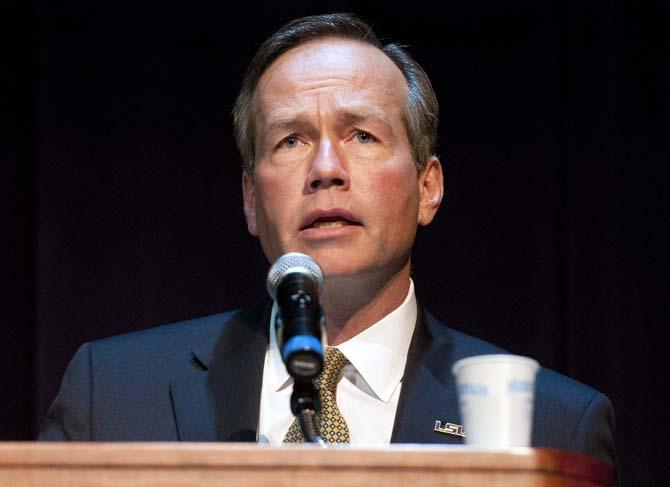The recommendation of President Designate F. King Alexander has brought renewed energy and direction to the University reorganization process that ultimately hinges on the leadership of the LSU president, said SSA Consultant Christel
Slaughter.
An external opinion by a visionary leader is what the Transition Advisory Team has been looking for, and knowing who that leader will probably be makes the reorganization concept more meaningful and real than ever before, Slaughter said.
“[Alexander] is going to be able to bring his own thoughts to the mix,” Slaughter said. “When he sees our skills and where we’re lacking, he can help figure out what our priorities should be and where to direct resources.”
Slaughter said this new perspective is essential to the process that officially began with the Transition Advisory Team kickoff meeting Jan. 8, which has grown since then to include five subcommittees, a Legal and Regulatory Advisory Group and six task forces that, together, total a team of about 100 who have been working to discern the best direction for the University.
“We’re excited to hear about what his vision is and what he wants to focus on,” said Executive Vice Chancellor and Provost Stuart Bell. “I think he’s going to be listening to the students and different campuses about how they see our current situation.”
Alexander said he expects to assume the presidency the first week of July, amid the reorganization and a challenging budget situation that has spread the University’s resources thin.
Prioritizing students, research and public service are just a few of Alexander’s focuses when it comes to the reorganization, but he also said the University and state administration need to work together to increase the University’s status as a valuable state asset.
Alexander said higher education can be a force that creates opportunities and improves the state economy by producing graduates with degrees who will contribute to the Louisiana workforce. This plan will help the state regain some ground it has lost in recent years, he said.
“[The reorganization] has a lot of potential,” Alexander said. “I think we should work together to address weaknesses.”
Alexander said thriving higher education can contribute to the Louisiana economy and vice versa.
“A rising tide lifts all boats,” Alexander said.
Although Alexander doesn’t have a specific vision yet, he said he is excited to learn as much as he can and be a part of the process.
Slaughter said Alexander’s ideas will provide a fresh perspective for the Transition Advisory Team.
“When you get hired as a new president like this, you have an advantage because you’re coming from the outside and aren’t locked into any framework about how things need to be,” Slaughter said. “It allows you to think big and broadly about what the University could be.”
Bell said he was excited to work with Alexander and usher the University into a new chapter of success, despite the challenges that lie ahead.
“[Alexander’s] success will lend itself to the challenges and opportunity that we have,” Bell said. “There are a lot of moving parts right now, but we’re going to work together.”
“[Alexander] is going to be able to bring his own thoughts to the mix.”







